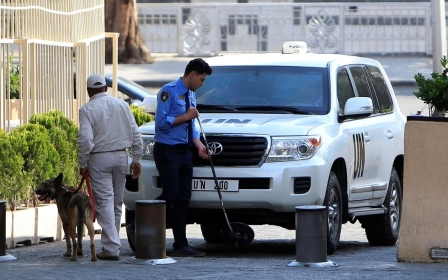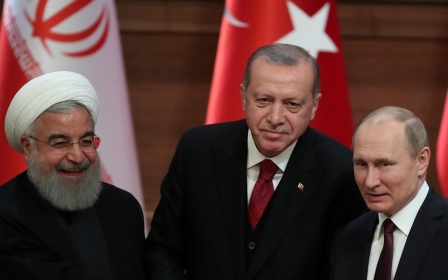Russia driving huge online 'disinformation' campaign on Syria gas attack, says UK

The British government has accused Russia of launching a far-reaching internet disinformation campaign in the weeks after a suspected chemical attack in Syria and the poisoning of a Russian dissident in the UK, with a 4,000 percent increase in activity by social media "bots", trolls and automated accounts.
Theresa May, the British prime minister, said British analysis had identified Kremlin inspired accounts that have repeatedly posted messages to spread disinformation and distort the truth - which was part of a "wider effort to undermine the international system".
This disinformation campaign is intended to undermine... institutions such as the Organisation for the Prevention of Chemical Weapons
- Theresa May
May's comments on Thursday evening came almost two weeks after a suspected gas attack on Douma in Syria, which killed 40 people and sparked Western air strikes against Syrian chemical facilities, and the 4 March poisoning in Salisbury in the UK of Sergei Skripal and his daughter Yulia by a "novichok" nerve agent. The nerve agent was of a type developed in Russia, say experts, although its precise origin has not been determined.
The prime minister said: "Last month, a military grade nerve agent was brazenly and recklessly deployed on the streets of Salisbury. As the UK, EU, G7, Nato and many other countries have concluded, there is no other plausible explanation than Russia is to blame.
"In Syria, a dangerous pattern of behaviour has developed in which chemical weapons... are being used by the Assad regime against its own people in the most abhorrent way imaginable.
"Meanwhile, Russia is using cyber as part of a wider effort to undermine the international system. This disinformation campaign is not just aimed at social media and the UK - it is intended to undermine the actual institutions and processes of the rules based system, such as the Organisation for the Prevention of Chemical Weapons.
"We must do all we can at every turn to challenge this."
One Twitter account identified as a Russian "bot" by UK government analysis, @Partisangirl, posted more than 2,300 tweets in less than a fortnight - an average of 200 posts a day. Those posts reached about 62 million people.
The research, by Whitehall officials, found that many of the accounts commented on both events in Salisbury and Syria.
Posts included support for articles claiming the poison used on the streets of Salisbury was not Russian, and the theory that Porton Down, the British chemical weapons research lab, manufactured the chemical agents used in Douma on 7 April.
Separately, government social media experts have documented more than 45,000 posts propagating disinformation narratives in the two weeks since the Syria attack on 7 April, with a potential reach of about 20 million social media users.
Russia denies any role in the Salisbury poisoning. It has produced several narratives on the Douma attack, including: it was a "false-flag" operation by Western-backed rebels to provide an excuse to attack Syria; there never was an attack; images of civilians suffering the effects of exposure were staged; and Russian inspectors sent to Douma found no evidence of an attack.
Russia has also released what it says are images of "terrorist" chemical weapons facilities in areas surrounding Douma, and has labelled both suspected attacks part of a "Anglo-Saxon" conspiracy against Russia and its allies.
Chemical weapons inspectors from the OPCW arrived in Damascus on Saturday but as of Friday morning have been unable to travel to Douma due to safety concerns.
The Russian government this week blamed Syrian rebels for the delay, only days after saying the area was in the full control of the Syrian military and was being patrolled by Russian military police.
Middle East Eye propose une couverture et une analyse indépendantes et incomparables du Moyen-Orient, de l’Afrique du Nord et d’autres régions du monde. Pour en savoir plus sur la reprise de ce contenu et les frais qui s’appliquent, veuillez remplir ce formulaire [en anglais]. Pour en savoir plus sur MEE, cliquez ici [en anglais].




